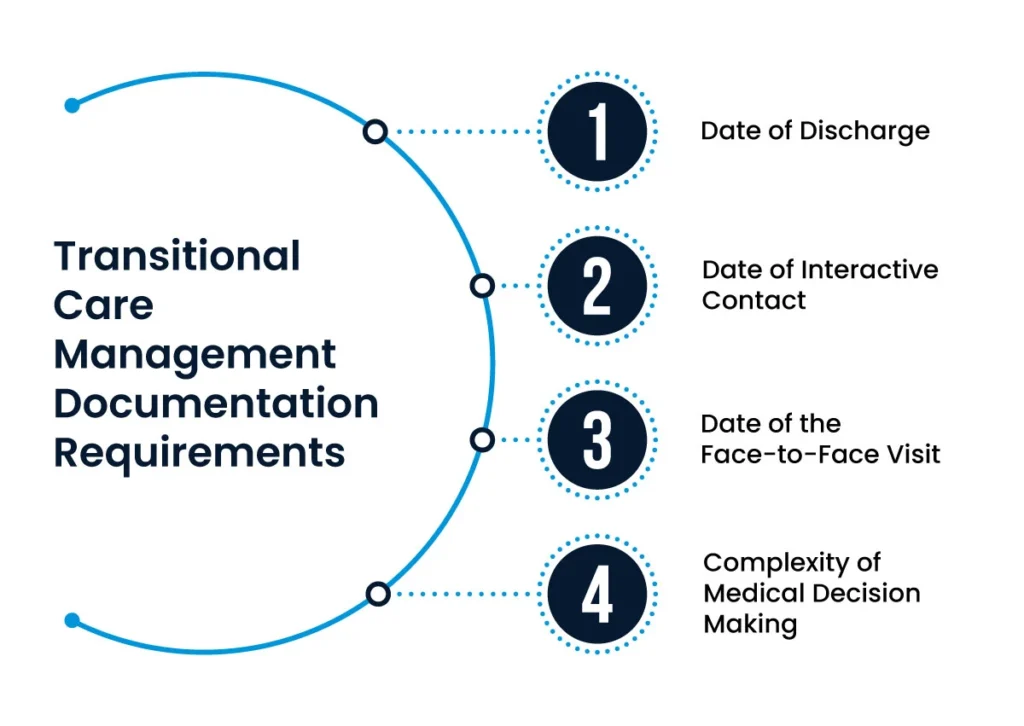

Transitional Care Management (TCM) is an essential facet of healthcare, bridging the gap between hospital discharge and patient home care. It encompasses a range of services and coordination activities designed to ensure a safe and smooth transition for patients. But what exactly does TCM involve, and why is it increasingly important in our healthcare system?
This comprehensive guide delves into the intricacies of Transitional Care Management. We’ll explore its key components, from medication management to follow-up care coordination, and why they play a crucial role in preventing readmissions and improving patient outcomes. If you’re a healthcare provider looking to enhance your understanding of TCM, you’re in the right place. Let’s unfold the layers of TCM together.
Transitional Care Management (TCM) is an integral yet often misunderstood component of healthcare. It’s the bridge connecting the gap between hospital and home, ensuring patients receive the continuous care they need after they leave the hospital. But what does this really entail?
At its core, TCM is a patient-centric approach focusing on coordinating and managing medical care and services for patients transitioning from an inpatient hospital setting to other care environments, such as their home or a rehabilitation facility. This period, typically spanning 30 days post-discharge, is crucial. Why? It’s during this time that patients are most vulnerable to complications, including medication errors, lapses in treatment plans, and even hospital readmissions.
As we have already found out, Transitional Care Management (TCM) services are a set of healthcare services that help patients move from a hospital or facility back to their community. Here are the key requirements for providing TCM services in simpler terms:
Helping Patients Move Home: TCM services are meant to assist patients when they leave a hospital or facility and go back to their homes or communities.
No Gaps in Care: Healthcare professionals need to be available to take care of the patient right after they leave the hospital, without any delays or gaps in service.
Taking Care of Patients: The healthcare team is responsible for looking after the patient’s health and well-being during this transition period.
Dealing with Complex Cases: TCM services are particularly important for patients with serious medical issues or problems related to their mental and emotional well-being. The healthcare team must make important medical decisions for these patients.
The TCM services are provided for a period of 30 days, starting from the day a patient is discharged from one of these specific healthcare settings. The patient must be discharged from one of the following healthcare settings to be eligible for TCM services
After being discharged from one of the eligible inpatient settings, the patient must return to their community setting, which could include:
TCM services can involve both face-to-face visits with patients and non-face-to-face services like monitoring and coordination of care. The following healthcare professionals are eligible to provide TCM services and may also supervise other clinical staff:
TCM success hinges on several key components. Understanding and effectively implementing these elements can significantly enhance patient outcomes and reduce the risk of hospital readmissions. Here are five crucial components that determine the success of Transitional Care Management:
The cornerstone of successful TCM is a well-orchestrated care plan subjected to each patient’s unique needs. This plan should be developed collaboratively by the multidisciplinary healthcare team and should include a clear outline of the patient’s medical history, current health status, medications, and post-discharge treatment goals.
Communication is key in TCM, not just among healthcare providers, but also with patients and their families. Ensuring that patients understand their condition, the importance of medication adherence, and when to seek medical help is crucial for preventing complications.
Regular follow-up calls and open lines of communication between patients and their care team can foster a trusting relationship and encourage patient engagement in their own care.
Scheduling and conducting timely follow-up appointments, whether in person or through telehealth services, play a critical role in TCM. These appointments allow healthcare providers to monitor the patient’s progress, adjust medications if necessary, and address any emerging health concerns before they escalate into serious issues.
Proper medication management is a vital aspect of TCM. This includes conducting a thorough medication reconciliation post-discharge to ensure that the patient’s medication list is accurate and up-to-date.
Educating patients about their medications, including potential side effects and interactions, is equally important to ensure adherence and prevent complications.
Educating patients and their caregivers about the patient’s condition, care plan, and what signs and symptoms to watch for is essential. Empowering them with this knowledge enables them to take an active role in the care process, leading to better health outcomes.
Additionally, involving caregivers in the planning and transition process can provide additional support for patients, ensuring they have the help they need at home.
Billing for Transitional Care Management (TCM) services involves going through specific guidelines and codes to ensure proper reimbursement. TCM services are billed using two primary Current Procedural Terminology (CPT) codes, each reflecting the level of medical complexity and the required timing for a face-to-face visit post-discharge.
It’s important to note that the same healthcare professional can perform various roles throughout the process. They may discharge the patient from the hospital, provide discharge services, and also bill for TCM services. However, a critical point to remember is that the face-to-face visit required for TCM cannot occur on the same day as the discharge management services.
When billing for TCM, additional evaluation and management services that are reasonable and necessary for managing the patient’s clinical issues can be reported separately, provided they are not part of the required face-to-face visit.
There are also specific exclusions to keep in mind. For instance, TCM services cannot be billed if any part of the 30-day TCM period falls within a global period for a procedure code billed by the same practitioner. Moreover, certain codes cannot be reported during the TCM period, including Care Plan Oversight services (HCPCS codes G0181 and G0182) and End-Stage Renal Disease services (CPT codes 90951 – 90970).
Proper documentation is a pivotal aspect of Transitional Care Management (TCM), ensuring not only compliance but also the efficacy of patient care. For healthcare providers, maintaining accurate and detailed records is key to successful TCM billing and overall patient management. Here’s a breakdown of the essential documentation requirements for TCM:

By leveraging technology, RPM offers a proactive approach to patient care during the critical post-discharge period
RPM allows healthcare providers to continuously monitor vital health parameters such as heart rate, blood pressure, glucose levels, and oxygen saturation remotely. This real-time data can be crucial for early detection of potential complications.
RPM can include medication tracking systems, reminding patients to take their medications on time and alerting healthcare providers in case of missed doses. This is particularly important in TCM, where proper medication management is critical.
By enabling early detection of health issues and improving adherence to care plans, RPM can help reduce the risk of hospital readmissions.
As we wrap up our exploration of Transitional Care Management (TCM), it’s clear that this aspect of healthcare plays a pivotal role in bridging the gap between hospital and home. TCM is not just a protocol; it’s a commitment to patient-centered care, ensuring a safe and effective transition for patients during a vulnerable period in their health journey.
From understanding what TCM entails, and identifying who can provide these services, to acknowledging the critical components that ensure its success, and embracing the innovative role of telehealth, we’ve covered a spectrum of topics that highlight the importance and complexity of TCM.
Remember, successful TCM is characterized by comprehensive planning, coordinated care, and a deep understanding of each patient’s unique needs. It requires a collaborative effort among healthcare professionals and effective communication with patients and their families. As healthcare continues to evolve, the integration of technology, especially telehealth, further enhances the ability to provide timely, effective, and personalized care.
Talk to an Expert Now